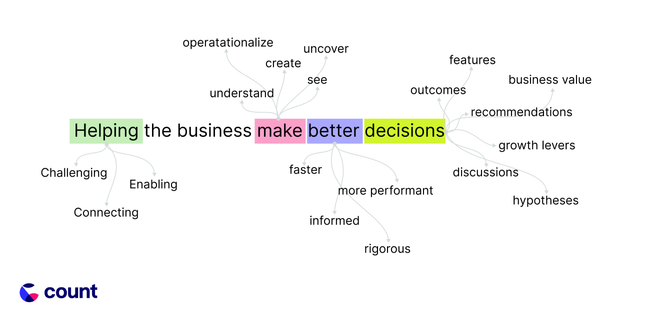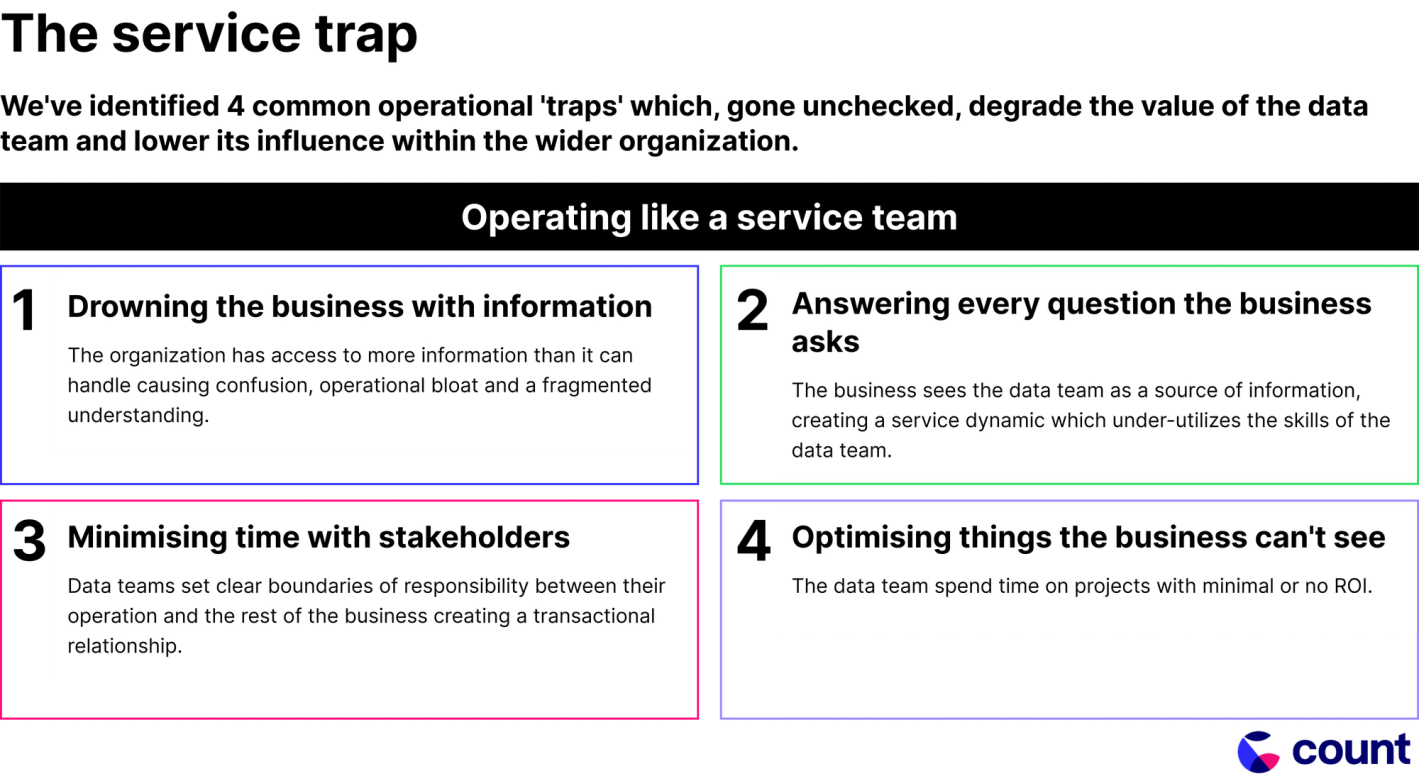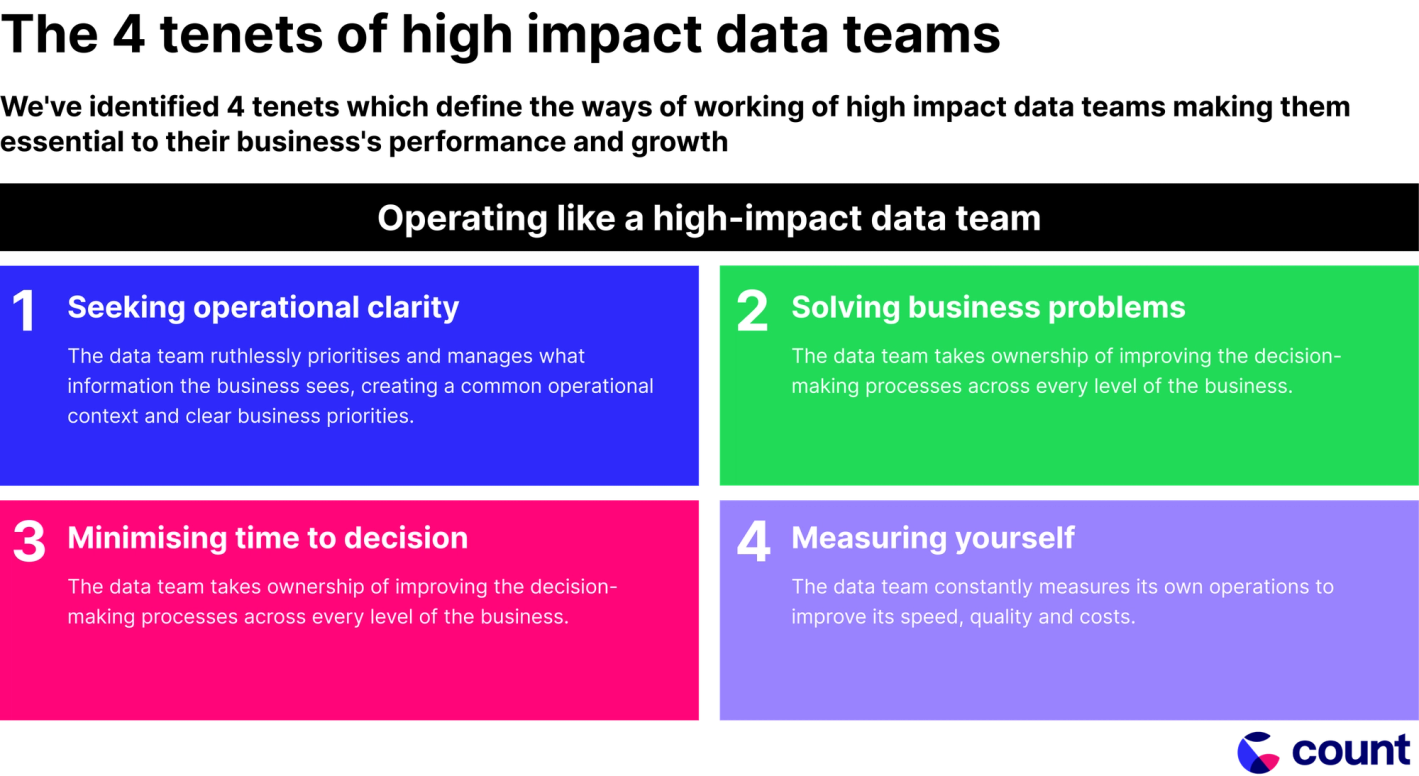Discovering the tenets of high-impact data teams
A new reality
Over the past year, it’s clear that the game has changed for data teams. We used to live in a world where zero interest rates let us invest like crazy in infrastructure, and hire the team of our dreams without a second thought. But now, in 2024, things feel very different. Budgets are under the microscope, hiring is flat or declining, and data teams have to prove their worth more than ever.
This led to a lot of chatter in the data community about ROI. I’ve seen plenty of ideas floating around about reducing dashboards and monitoring database costs etc, but these ideas often feel fragmented and piecemeal. There’s no overarching framework that describes at a strategic level the areas of responsibility and focus that the data team should focus on.
This confusion feels particularly data-centric. Product, marketing, and even HR teams have been immune to this level of questioning. They may be asked to prove howwellthey are delivering value, but not what the core value is. Their area of responsibility is well-defined both in the discipline and by the wider business community.
In data, though, it feels like we’re still trying to figure out our role. Yes, we’d all say our goal is to improve “decision-making within the business” but this feels so high-level and abstract as to be useless and leaves the role of the data team open to interpretation both by us and the wider organizations we work with.

So early this year I set out to change that.
Developing a framework
One of the perks of my job is how it allows me to speak with hundreds of data teams about how they work and recently I’ve been focusing my conversations on exactly this topic - ROI. I’ve been trying to determine the common traits, or tenets, that distinguish the teams who seem to be driving huge impact to their organizations vs those whose role and impact feel more vague.
As much as I’d love this to have been an exact science, this has been almost solely an empirical exercise. But the results have been fascinating, highlighting some common ideas and principles that define value generation, and some common “traps” that drag data teams into ways of working that diminish their value over the medium term.
The goals of developing these tenets and traps are to:
- help data teams see which areas they need to work on
- language to share with the rest of the org to explain the data team’s value
- create a framework around which to share best practice
The common themes
In these discussions, a few common themes emerged:
1. Relationship dynamics
At its core the big difference between high-value data teams is that they work with their wider organization as peers, the relationship dynamic is “adult to adult” to use the common psychology framework. This contrasts with the more “parent to child” dynamic data teams can have with their organizations where the data team run to the drum of the wider business.
2. When it’s working, it’s not measured. It’s obvious
The teams I spoke to who seemed to have it figured out didn’t have a clever way to measure their value or their ROI. It was obvious. Everyone in the organization felt it and experienced it daily.
3. Not just about analytics
While analytics is most often on the front line, high-performing data teams go beyond that. Data engineering and even data science are just as eagerly brought into the conversation on ROI as analytics and BI functions.
The common traps
I also noticed common traps data teams find themselves in that prevent them from being as valuable as they could:

1. Drowning the business with information
The organization has access to more information than it can handle, causing confusion, operational bloat, and a fragmented understanding.
2. Answering every question the business asks
The business sees the data team as a source of information, creating a service dynamic which underutilises the skills of the data team.
3. Minimising time with stakeholders
Data teams set clear boundaries of responsibility between their operation and the rest of the business creating a transactional relationship.
4. Optimising things the business can't see
The data teams spends time on projects with minimal or no ROI.
The tenets of high-impact data teams
The final result of these conversations and reflections are the following for tenets for high-impact data teams:

1. Seeking operational clarity
The data team ruthlessly prioritises and manages what information the business sees, creating a common operational context and clear business priorities. This includes focusing on improving clarity and conciseness in all forms of communication, working with the business to continually clarity its core levers of growth and how they fit together, and making sure the business has a clear set of priority areas.
2. Solving business problems
The data team works with the business directly to define and solve the biggest challenges which limits growth. This means treating the data team as a specialist problem-solving resource, moving away from simply providing information and towards working collaboratively with the business to help define and structure the problem solve.
3. Minimising time to decision
The data team takes ownership of improving the decision-making processes across every level of the business. This means taking ownership of the entire decision process, not just being the information providers, optimizing the efficiency of the business over the efficiency of the data team.
4. Measuring yourself
The data team constantly measures its own operations to improve its speed, quality, and costs. This means knowing which projects and activities you’re spending your time on, and quantifying the ROI of any infrastructure projects to avoid over-engineering.
What’s next?
Over the next few weeks, we'll be exploring these tenets in more details - sharing stories from data leaders on how they've put these tenets into action and answering some of the common questions on how to do it.
To get involved:
- Subscribe